#html website design with source code
Explore tagged Tumblr posts
Text
Empowering Business Growth: Techglide Leads Custom Software Development Companies in India
In the dynamic landscape of digital transformation, businesses are increasingly recognizing the pivotal role of custom software solutions in gaining a competitive edge. Among the myriad of choices, Techglide emerges as a beacon of innovation, standing tall among custom software development companies in India. Let's delve into the reasons why Techglide is at the forefront of this technological revolution.
Unveiling Techglide’s Expertise
Techglide has earned its reputation as a trailblazer in the realm of custom software development in India. With a team of seasoned professionals, the company is committed to delivering bespoke solutions that precisely align with the unique requirements of businesses across diverse industries. Techglide's track record speaks for itself, showcasing a relentless pursuit of excellence and a commitment to pushing the boundaries of what is possible.
Tailored Solutions for Every Business Need
One of the defining characteristics that sets Techglide apart from other custom software development companies in India is its focus on tailoring solutions. Techglide understands that a one-size-fits-all approach doesn't cut it in today's dynamic business environment. Hence, the company places a premium on understanding the intricacies of each client's operations and objectives, ensuring that the delivered software is not just functional but a strategic asset.
Techglide's Innovation Ecosystem
Innovation is the cornerstone of Techglide's success story. As one of the leading custom software development companies in India, Techglide invests in staying ahead of the technological curve. The company's commitment to continuous learning and adaptation to emerging technologies positions it as a reliable partner for businesses aspiring to embrace the latest advancements in software development.
Collaborative Approach for Success
Techglide believes in fostering strong and collaborative relationships with its clients. Unlike some custom software development companies in India, Techglide views every project as a partnership, working closely with clients to understand their goals, challenges, and visions. This collaborative approach ensures that the final software product not only meets but exceeds expectations.
Techglide's Impact Across Industries
The versatility of Techglide's custom software solutions is evident in its successful deployments across various industries. From healthcare to finance, manufacturing to e-commerce, Techglide has left an indelible mark by empowering businesses with robust, scalable, and innovative software solutions.
In conclusion, Techglide's position among the top custom software development companies in India is well-earned. The company's unwavering commitment to excellence, focus on tailored solutions, innovative mindset, collaborative approach, and impact across diverse industries make it the go-to choice for businesses looking to leverage custom software for sustainable growth. As the digital landscape evolves, Techglide stands ready to lead the way, consistently delivering cutting-edge solutions that redefine the possibilities of custom software development in India.
#custom software development companies in india#custom ecommerce development services#custom web application development services#custom application development company#android app development companies in india#html website design with source code#how to change app icons iphone
0 notes
Text
Welcome!
Hello and welcome to The Neopian Biology Project!
This blog is an offshoot of a series of posts started on my main account. It is run by me, @asterixcalibur, in association with Happy Lab Accidents on @cabletwo. I'm an artist and funny person by trade, but a biologist by tragic BDGilbertian retribution.

The goal of this project is to identify all of Neopia's unique species, categorize them by kingdom and region of origin, and find an ideal specimen for each that can be put into a natural history museum (my gallery on Neopets). As of writing, the project has identified over 2000 unique species of Neopian wildlife.
Our main methodology is scouring item descriptions for helpful information. This process also involves researching and standardizing the taxonomical, ecoregional, and evolutionary timeline terminology of Neopia.
Longer term goals are to obtain the ideal specimen of every identified species for the museum, and renovate the museum into a simulated museum experience through careful application of visual assets and CSS/HTML. Maybe one day we can shoot for the Gallery Spotlight?
On Neopets
My account on Neopets is classypotassium. Feel free to ask to be NeoFriends -- just tell me who you are here!
The Neopian Biological Sciences Natural History Museum itself is here.
Ways to Contribute
1. Donate a specimen
If you'd like to donate or loan a specimen to the museum, contact me so we can discuss attribution and collateral!
The gallery's JellyNeo wishlist is here. It will be continually updated as specimens are identified, so consider it a work in progress. As of writing I also haven't checked anything off even if it's been obtained, so double check the museum before offering donations!
2. Donate Neopoints
You can also "donate" by buying a Plushie Fungus from my shop! These are intentionally overpriced so that the change can be considered a charitable donation.
3. Interact here!
A lot of the posts that end up here are going to be asking for people's thoughts on origin, kingdom, uniqueness, and so on, through polls and direct questions.
You can also submit items, images, links, art, specimens, fossils, documentation, scientific papers, primary sources, etc. and so on, for consideration by the Project!
You don't need to know anything about Neopets to put in your two NP (or cents USD). In fact, sometimes it's better to get a perspective grounded in normal Earth biology, because, speaking as a biologist here in Neopia, I can very well say oh ym god please help ohhhh my god you don't even know
Conclusion
You don't need to be into Neopets to enjoy or contribute to this blog; I'll try my best to write posts so that they can be enjoyed by anyone aware of but not necessarily into Neopets. In my experience, explaining Neopets to someone entirely unfamiliar with it is always fun. This shit runs deep, dark, and as spaghetti as its code. Best part of Neopets, to me, is that the site rewards you for exploration, and some of the most consequential but by far weirdest lore can only be found by happening upon a page six links deep into a chain of site features that have gone untouched since 2009, as part of a philosophy of interaction that runs the entire site and is entirely against modern website design principles.
Anyway,

Thank you for visiting!
Science awaits!
52 notes
·
View notes
Note
Hi!! I saw your blog and it's beautiful! I'd like to ask if you could share some tips about editing posts, specifically changing the font color and doing that cool effect where it has more than one color on the same font ☺ if you're not comfortable teaching that's okay too! Have a good night

Hello Siren,
Thank you for the compliment. Yes, I can teach you. Just follow a tip from Auntie here: do it because you genuinely like the aesthetic. The time you spend writing the post is sometimes the same as editing it, and in my experience, this won't necessarily translate into more likes or reblogs. So, do it because you think it's beautiful.
As comical as it sounds, I won't be using HTML in this post because using the codes could cause problems. I've seen some tutorials, but I just really learned when I searched on my own.. I also do all my editings on my notebook. So, here's everything I use:

Websites I use for editing:
HTML Code Editor: While you're creating your HTML, you can simultaneously see if it's working
BBcode & HTML Text Colorizer: This is where you'll create the gradient
Browserling: I use this site to make the gradient code compatible for Tumblr
Aesthetic Symbols: this is for that cute symbols
Piliapp: more copy/paste symbols
Fontes e Letras: copy/paste fonts
Canva: This is where I create some of my designs. I also use Photoshop
Deviantart: a lot of material for Photoshop like templates, PSDs and Renders (PNG image with a good resolution), you can see the ones I use the most in my sources
@animatedglittergraphics-n-more: dividers
@saradika: dividers
@engrampixel: cute material
Color Hunt: if you don't have a color pallete in mind, here you can find a lot of options
Adobe Color: if you want to create your own HTML color palette this site can help
DaFont: where I download my fonts, the ones I use the most are: Betterfly, Arcadepix, Starborn, Lemon Milk, Cursive Sans and BubbleGum
EmojiTerra: as I use tumblr on my notebook, this is where I get my emojis

HTML Text Editing
Important:
Go use the HTML Code Editor in this part and your life will be way easier.
Some things I do right here in the tumblr editor, like putting the images and different fonts like Lucille.
All HTML code starts with < > and ends with , that is, when you start a paragraph you will write <p> and when you finish you will write </p> (HTML Code Editor ends your coding automatically)
I'm teaching all this because if you want to make gradients in your entire text and not just in the title, you'll need to know about html
To start your HTML you will need to go to the gear that appears on the right side when you are writing your post, go to the bottom until you find the Text Editor and switch to HTML.

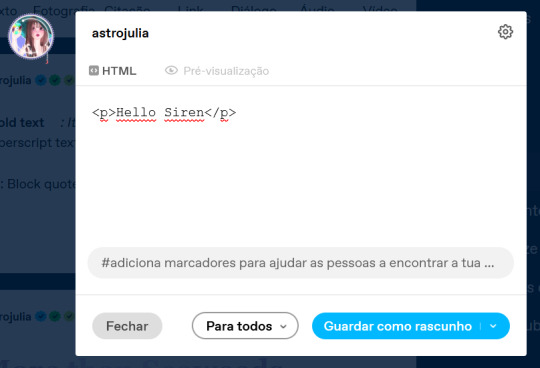

The Codes
<p> start a paragraph </p>
<br> to make a space between text less than a paragraph (good to use in indented text) you don't need to put </br>
<b> make the text bold </b>
<i> leave the text in italics</i>
<strike> leave the text crossed out </strike>
<small> make the text small like this </small>
<h1> make the text large like this </h1>
<h2> make the text large like this </h2>
<ul> Create unordered list (dotted) </ul>
<ol>Create lists with order (numeric) </ol>
*instead of making paragraphs you will create new items in the list using the code <li> </li>
<blockquote class="npf_indented"> make the text indented </blockquote>
<span style="color: #HTML"> Code to color your texts, pay attention that it uses (") instead of (') and doesn't use (;) </span>
Tutorial on creating invisible spaces, just like I use to do the navigation, if I put it here everything bugs. PT-BR
<a href="URL">Link Text</a>: Creates a hyperlink

Making your Gradient
Go to BBCode and HTML already with your HTML text and colors in hand. Write or copy your text in the box, choose the gradient type (I use middle) and select your colors (from one to three different colors)
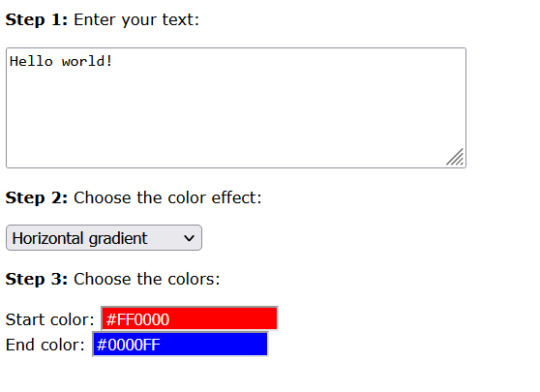

Now copy the text in the "HTML code for this text: (To use on your website)" box and go to the Browseling, you will replace the (') to (") and the (;) for nothing
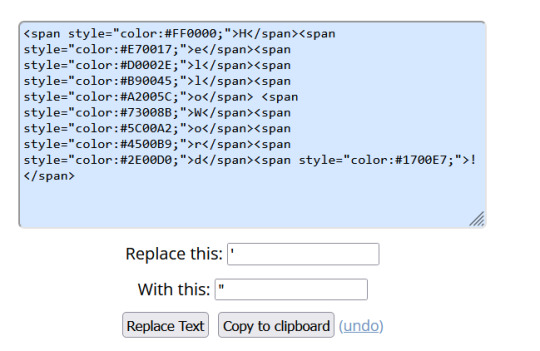
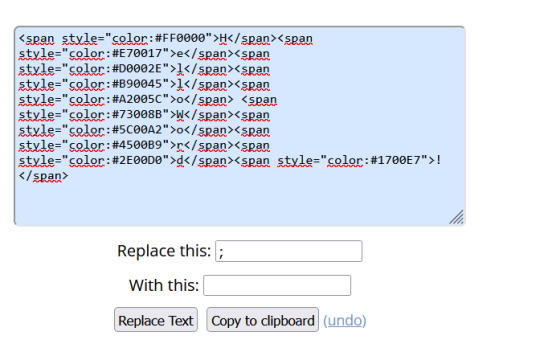
Copy and paste your new code direct in your tumblr post editor or in the HTML Code Editor. Success!!
I think that's all. Kisses from the Sea! 🐚

185 notes
·
View notes
Text
How to get into Coding!
Coding is very important now and in the future. Technology relies on coding and in the future you will need to know how to code to get a high-paying job. Many people consider having Computer Science field-related jobs, especially in AI. What if you are interested it in general or as a hobby? What if you don't know what you want to do yet for college?
Pick a language you want to learn: Personally, I started out with HTML and CSS. I recommend if you want to do web design HTML and CSS are good languages to start with. Otherwise, start with JavaScript or Python.
2. Find Resources: Basically you want to look at videos on YouTube, and take classes that have coding like AP CSP, AP CS A (harder class), Digital Information Technology, etc. You can also attend classes outside in the summer like CodeNinjas and use websites like code.org, freeCodeCamp, and Codecademy. Also, ask your friends for help too! You can find communities on Reddit and Discord as well.
3. Start Practicing: Practice slowly by doing small projects like making games for websites and apps. You can work with friends if you are still a beginner or need help. There's also open-source coding you can do!
4. Continue coding: If you don't continue, you will lose your skills. Be sure to always look up news on coding and different coding languages.
5. Certifications: If you are advanced in coding or want to learn more about technology, you can do certifications. This can cost a lot of money depending on what certification you are doing. Some school districts pay for your certification test. But if you take the test and pass, you can put it on your resume, and job recruiters/interviewers will be impressed! This can help with college applications and show initiative if you want a computer science degree. This shows you are a "master" of the language.
#tech#coding#learning#education#hobby#fun#jobs#high school#college#university#youtube#reddit#certification#javascript#java#python#html css#css#html#ap classes#ap csp#information technology#technology#computer science#programming#software engineering#web design#web development#discord chat#discord server
9 notes
·
View notes
Text

The Comprehensive Guide to Web Development, Data Management, and More
Introduction
Everything today is technology driven in this digital world. There's a lot happening behind the scenes when you use your favorite apps, go to websites, and do other things with all of those zeroes and ones — or binary data. In this blog, I will be explaining what all these terminologies really means and other basics of web development, data management etc. We will be discussing them in the simplest way so that this becomes easy to understand for beginners or people who are even remotely interested about technology. JOIN US
What is Web Development?
Web development refers to the work and process of developing a website or web application that can run in a web browser. From laying out individual web page designs before we ever start coding, to how the layout will be implemented through HTML/CSS. There are two major fields of web development — front-end and back-end.
Front-End Development
Front-end development, also known as client-side development, is the part of web development that deals with what users see and interact with on their screens. It involves using languages like HTML, CSS, and JavaScript to create the visual elements of a website, such as buttons, forms, and images. JOIN US
HTML (HyperText Markup Language):
HTML is the foundation of all website, it helps one to organize their content on web platform. It provides the default style to basic elements such as headings, paragraphs and links.
CSS (Cascading Style Sheets):
styles and formats HTML elements. It makes an attractive and user-friendly look of webpage as it controls the colors, fonts, layout.
JavaScript :
A language for adding interactivity to a website Users interact with items, like clicking a button to send in a form or viewing images within the slideshow. JOIN US
Back-End Development
The difference while front-end development is all about what the user sees, back end involves everything that happens behind. The back-end consists of a server, database and application logic that runs on the web.
Server:
A server is a computer that holds website files and provides them to the user browser when they request it. Server-Side: These are populated by back-end developers who build and maintain servers using languages like Python, PHP or Ruby.
Database:
The place where a website keeps its data, from user details to content and settings The database is maintained with services like MySQL, PostgreSQL, or MongoDB. JOIN US
Application Logic —
the code that links front-end and back-end It takes user input, gets data from the database and returns right informations to front-end area.

Why Proper Data Management is Absolutely Critical
Data management — Besides web development this is the most important a part of our Digital World. What Is Data Management? It includes practices, policies and procedures that are used to collect store secure data in controlled way.
Data Storage –
data after being collected needs to be stored securely such data can be stored in relational databases or cloud storage solutions. The most important aspect here is that the data should never be accessed by an unauthorized source or breached. JOIN US
Data processing:
Right from storing the data, with Big Data you further move on to process it in order to make sense out of hordes of raw information. This includes cleansing the data (removing errors or redundancies), finding patterns among it, and producing ideas that could be useful for decision-making.
Data Security:
Another important part of data management is the security of it. It refers to defending data against unauthorized access, breaches or other potential vulnerabilities. You can do this with some basic security methods, mostly encryption and access controls as well as regular auditing of your systems.
Other Critical Tech Landmarks
There are a lot of disciplines in the tech world that go beyond web development and data management. Here are a few of them:
Cloud Computing
Leading by example, AWS had established cloud computing as the on-demand delivery of IT resources and applications via web services/Internet over a decade considering all layers to make it easy from servers up to top most layer. This will enable organizations to consume technology resources in the form of pay-as-you-go model without having to purchase, own and feed that infrastructure. JOIN US
Cloud Computing Advantages:
Main advantages are cost savings, scalability, flexibility and disaster recovery. Resources can be scaled based on usage, which means companies only pay for what they are using and have the data backed up in case of an emergency.
Examples of Cloud Services:
Few popular cloud services are Amazon Web Services (AWS), Microsoft Azure, and Google Cloud. These provide a plethora of services that helps to Develop and Manage App, Store Data etc.
Cybersecurity
As the world continues to rely more heavily on digital technologies, cybersecurity has never been a bigger issue. Protecting computer systems, networks and data from cyber attacks is called Cyber security.
Phishing attacks, Malware, Ransomware and Data breaches:
This is common cybersecurity threats. These threats can bear substantial ramifications, from financial damages to reputation harm for any corporation.
Cybersecurity Best Practices:
In order to safeguard against cybersecurity threats, it is necessary to follow best-practices including using strong passwords and two-factor authorization, updating software as required, training employees on security risks.
Artificial Intelligence and Machine Learning
Artificial Intelligence (AI) and Machine Learning (ML) represent the fastest-growing fields of creating systems that learn from data, identifying patterns in them. These are applied to several use-cases like self driving cars, personalization in Netflix.
AI vs ML —
AI is the broader concept of machines being able to carry out tasks in a way we would consider “smart”. Machine learning is a type of Artificial Intelligence (AI) that provides computers with the ability to learn without being explicitly programmed. JOIN US
Applications of Artificial Intelligence and Machine Learning: some common applications include Image recognition, Speech to text, Natural language processing, Predictive analytics Robotics.
Web Development meets Data Management etc.
We need so many things like web development, data management and cloud computing plus cybersecurity etc.. but some of them are most important aspects i.e. AI/ML yet more fascinating is where these fields converge or play off each other.
Web Development and Data Management
Web Development and Data Management goes hand in hand. The large number of websites and web-based applications in the world generate enormous amounts of data — from user interactions, to transaction records. Being able to manage this data is key in providing a fantastic user experience and enabling you to make decisions based on the right kind of information.
E.g. E-commerce Website, products data need to be saved on server also customers data should save in a database loosely coupled with orders and payments. This data is necessary for customization of the shopping experience as well as inventory management and fraud prevention.
Cloud Computing and Web Development
The development of the web has been revolutionized by cloud computing which gives developers a way to allocate, deploy and scale applications more or less without service friction. Developers now can host applications and data in cloud services instead of investing for physical servers.
E.g. A start-up company can use cloud services to roll out the web application globally in order for all users worldwide could browse it without waiting due unavailability of geolocation prohibited access.
The Future of Cybersecurity and Data Management
Which makes Cybersecurity a very important part of the Data management. The more data collected and stored by an organization, the greater a target it becomes for cyber threats. It is important to secure this data using robust cybersecurity measures, so that sensitive information remains intact and customer trust does not weaken. JOIN US
Ex: A healthcare provider would have to protect patient data in order to be compliant with regulations such as HIPAA (Health Insurance Portability and Accountability Act) that is also responsible for ensuring a degree of confidentiality between a provider and their patients.
Conclusion
Well, in a nutshell web-developer or Data manager etc are some of the integral parts for digital world.
As a Business Owner, Tech Enthusiast or even if you are just planning to make your Career in tech — it is important that you understand these. With the progress of technology never slowing down, these intersections are perhaps only going to come together more strongly and develop into cornerstones that define how we live in a digital world tomorrow.
With the fundamental knowledge of web development, data management, automation and ML you will manage to catch up with digital movements. Whether you have a site to build, ideas data to manage or simply interested in what��s hot these days, skills and knowledge around the above will stand good for changing tech world. JOIN US
#Technology#Web Development#Front-End Development#Back-End Development#HTML#CSS#JavaScript#Data Management#Data Security#Cloud Computing#AWS (Amazon Web Services)#Cybersecurity#Artificial Intelligence (AI)#Machine Learning (ML)#Digital World#Tech Trends#IT Basics#Beginners Guide#Web Development Basics#Tech Enthusiast#Tech Career#america
4 notes
·
View notes
Text
Best of Web Development Courses: A Comprehensive Guide

Web development is a vital skill in today’s digital world. Whether you're aspiring to become a professional web developer or looking to enhance your skills, selecting the right web development course is crucial. With countless options available, it can be overwhelming to know where to start. This article provides a guide to the best web development courses available, helping you navigate through the top choices and find the one that suits your needs.
Why Take a Web Development Course?
Web development encompasses everything from creating basic websites to complex applications. The demand for skilled web developers is consistently high as businesses transition to digital platforms. By taking a web development course, you can:
Enhance your coding skills: Learn programming languages like HTML, CSS, JavaScript, and more.
Gain practical experience: Hands-on projects help you build a portfolio to showcase your skills.
Stay updated with industry trends: Modern courses keep you informed on the latest technologies and best practices.
Open career opportunities: Web development is a versatile field with various career paths such as front-end, back-end, or full-stack development.
Now, let’s dive into the top 10 web development courses that will give you the edge you need.
Top 10 Web Development Courses
The Web Developer Bootcamp – UdemyOverview: This course, created by Colt Steele, is one of the most popular web development bootcamps available. It covers everything from HTML, CSS, and JavaScript to more advanced topics like Node.js and Express.Why it stands out:
Over 63 hours of content.
Project-based learning with real-world applications.
Affordable pricing with regular discounts.
Ideal for: Beginners looking to get an in-depth introduction to web development.
Full-Stack Web Development with React – Coursera (offered by Hong Kong University of Science and Technology)Overview: This course focuses on the MERN stack (MongoDB, Express, React, Node). It's offered through Coursera by the Hong Kong University of Science and Technology, which gives it a reputable edge.Why it stands out:
Covers both front-end (React) and back-end development.
Offers a certificate from a prestigious institution.
Focuses on responsive web design.
Ideal for: Learners who want to focus on full-stack web development.
The Odin ProjectOverview: The Odin Project is a free, open-source curriculum that takes you through the entire web development process. It focuses on Ruby on Rails, JavaScript, and offers plenty of hands-on projects.Why it stands out:
Completely free with a community of learners.
Comprehensive learning paths from beginner to advanced.
Emphasizes practical projects.
Ideal for: Self-motivated learners looking for a free, community-driven option.
CS50’s Web Programming with Python and JavaScript – edX (Harvard University)Overview: CS50 is Harvard’s famous computer science course, and this specific track focuses on web programming. You’ll learn about Python, Django, JavaScript, and SQL through this rigorous program.Why it stands out:
Offered by Harvard University.
Covers complex web development topics such as Django and security.
Highly challenging, suitable for intermediate to advanced learners.
Ideal for: Developers with some background looking to dive deeper into web programming.
Complete Web Development Bootcamp – Udemy (Dr. Angela Yu)Overview: Dr. Angela Yu’s bootcamp is highly rated on Udemy for its engaging teaching style and comprehensive approach. You’ll learn HTML, CSS, JavaScript, Node.js, React, and even a little bit of web design.Why it stands out:
Over 55 hours of content.
Fun and engaging style with a focus on building projects.
Regularly updated to reflect the latest technologies.
Ideal for: Beginners who want to build a solid foundation in web development.
Responsive Web Design – freeCodeCampOverview: FreeCodeCamp is known for offering free, self-paced coding lessons, and its Responsive Web Design certification is one of the most popular. You’ll learn HTML5, CSS3, and responsive design principles.Why it stands out:
Free and self-paced.
300 hours of content including hands-on projects.
Community support and real-world project building.
Ideal for: Those looking for a free, structured way to learn responsive web design.
Zero to Mastery Complete Web Developer – Udemy (Andrei Neagoie)Overview: Andrei Neagoie’s course takes a hands-on approach to web development, covering everything from HTML and CSS to advanced topics like React and Node.js.Why it stands out:
Covers both front-end and back-end development.
Real-world projects like building a chat application.
Regularly updated to reflect industry changes.
Ideal for: Beginners to intermediate learners looking for comprehensive training.
Modern React with Redux – Udemy (Stephen Grider)Overview: React is one of the most in-demand front-end technologies today, and Stephen Grider’s course is perfect for those looking to specialize in it. This course covers React and Redux, focusing on building dynamic web applications.Why it stands out:
Specialized focus on React and Redux.
Project-based learning.
Great for intermediate learners.
Ideal for: Developers looking to specialize in React.
Learn Web Development – Mozilla Developer NetworkOverview: MDN’s web development course is a comprehensive, free resource that covers all aspects of web development. It’s created by the Mozilla Developer Network, known for its high-quality documentation.Why it stands out:
Free and constantly updated.
Covers the basics to advanced topics.
Reliable and well-documented resources.
Ideal for: Learners who prefer self-paced study with extensive documentation.
JavaScript, HTML, and CSS for Web Developers – Coursera (Johns Hopkins University)
Overview: This course, offered through Coursera by Johns Hopkins University, focuses on the fundamentals of JavaScript, HTML, and CSS, which are essential building blocks for any web developer.
Why it stands out:
Covers core web technologies.
Earn a certificate from a well-known university.
Focus on building real-world projects.
Ideal for: Beginners looking to get certified in web development fundamentals.
What to Look for in a Web Development Course
When choosing the best web development course for your needs, consider the following:
Skill Level: Are you a beginner or do you have some coding experience? Courses like The Odin Project and freeCodeCamp are great for beginners, while more advanced developers might prefer CS50’s Web Programming or Modern React with Redux.
Specialization: Do you want to focus on front-end (HTML, CSS, JavaScript), back-end (Node.js, Django), or full-stack development? Choose a course based on your career goals.
Project-Based Learning: A good web development course should include hands-on projects to help you apply what you've learned. The more projects, the better your portfolio will look to potential employers.
Certification: If you’re looking for recognition, consider courses that offer certificates from reputable institutions, like those from Coursera or edX.
Price: While some courses are free, others may require a one-time fee or subscription. Many platforms like Udemy offer discounts, so be sure to check regularly.
Final Thoughts
Whether you're just starting your journey in web development or looking to advance your skills, there’s a course out there for you. The best web development courses offer a blend of hands-on projects, updated content, and engaging instruction. As you consider the top 10 web development courses, think about your current skill level, your career aspirations, and your learning preferences. With the right course, you’ll be well on your way to becoming a proficient web developer.
Remember, learning web development is a marathon, not a sprint. Choose a course that fits your pace, stay consistent, and you'll see significant improvement in no time!
2 notes
·
View notes
Text
Proven Techniques for Ranking Higher on Google

Google is a powerful search engine, and seeking ways to place one's website at the top is important for enhancing the website's visibility, attracting more traffic, as well as the success of the online presence. At the digital marketing agency, we recognize that optimization is vital as there are millions of sites competing for the first places. Therefore, it is possible to use effective methods which cut across Google’s successful methods. In this article, we present systems that have been tested and proven to improve your google ranking and more traffic to your website.
1.Do a proper keyword research
Keyword research is the most important part of an SEO strategy. It is because by knowing what the intended audience is searching for you will be able to develop content that cuts across.
Action Steps:
Use Keyword Tools: Use high traffic specific keywords’ search volume tools like Google Keyword planner, Ahref, SEM rush etc. to search for keywords with low competition.
Analyze Competitors: Look at the keywords that are working for your competitors and narrow dow n on the related ones.
Focus on Long-Tail Keywords: The phrases are less competitive in nature and since they are more specific they lead to higher conversions.
2. Better the On-Page SEO Optimization
On page SEO Optimization is the process of editing and facilitating changes on the pages of a web document in order to make them rank well and fit to the targeted audience. Such changes may involve content optimization of the webpage, markup optimization improvement of the HTML source code.
Action Steps:
Rewriting and Optimization Strategy Title Tags and Meta Descriptions: Always ensure you note your page title and all the meta area as it has been promised to the readers and throughout the website.
Header Tags: Help cluster words and enhance comprehension by assigning H1 tags for the headline as the highest, H2, H3, etc for the subtitles.
URL Structure: Lines should be simple and moderate but include powerful words that are in line with what you are targeting.
Internal Linking: Where necessary links are created to other pages which are relevant to the current page being viewed by users and helps to spread out the link equity within the site.
3. Create High-Quality Content
Content is a very important element of SEO. Content, when properly designed, well written and is valuable and informative, will drive visitors, retain them and help establish credibility on a given niche.
Action Steps: Write for Your Audience: Use Solutions oriented approach where every word helps to eliminate audience problems.
Incorporate Keywords Naturally: Avoid abrupt keyword inclusion or excess use of keywords in the content.
Use Multimedia: Use of multimedia such as, images, animations, values etc to assist in a more appealing manner and also hold attention.
4.Enhance User Experience (UX)
The most important aspect with any Google ranking of the website is the user experience. Along with other factors, page speed, mobile usability, and site hierarchy are considerable for rankings.
Action Steps:
Improve Page Speed: It is possible to analyze why their site is slow through the use of Google PageSpeed and rectify the site’s speed. Spelling out some issues – Image compression, browser caching, CSS and javascript files minification.
Mobile-friendly Site Design: Create a website that is responsive to any device and that offers the same level of interaction regardless of the device used. With Google focusing on mobile first indexing, this becomes self-explanatory.
Utilize simple Structure: Website usability should be observed through the enabling of a better navigation structure and size of the website. This enables the website content to be easily accessed reducing the levels of bouncing.
5. Improve Quality of Backlinks
Links are an essential component of the parameters used in the Google algorithm, page rank among them. Backlinks from other websites with high reputation which are also relevant to the topic covered by a site will in most cases optimize the site.
Action Steps:
Develop Great Content: Write content that will drive people to share it, persuasive contents such as how to guides and case studies, original research.
Advertising through blogs: Write articles as a guest for reputable blogs in the niche and ensure to include a link to one’s site in the author information or within the article text.
6. Geo-targeting
For businesses that are into a certain geographic perspective, optimizing local search can get them local patrons and also enhance the local ranking.
Action Steps:
Claim Your Google My Business Listing: Your Google My Business profile must have all relevant details about your ventures such as addresses and business hours.
Social Media – Add Local Clientele Keywords: Identify local phrases and use them when generating content, title tags and meta descriptions.
Encouraging Reviews: Actively ask clients to review your services on Google and any other outlets and respond to them if possible, as good reviews will help boost your visibility in local search results.
7.Review and Performance metrics
It allows you to keep track of and evaluate your performance in line with search engine optimization. Bring out the strengths and weaknesses by utilizing the right tools.
Action Steps:
Google Analytics: Establish and analyze google analytical for effective tracking of such elements as the frequency of visitors, viewership and even exit of visitors.
Google Search Console: Use the GSC to see how well your web page performs, fixes, and submits the sitemap of your web page.
Finesse your strategies: With the use of prior or primary researches, refine any of your current seo methods. Adequate emphasis should be placed on aspects with some room for growth as well as recent developments on global search engine behaviors.
8. Follow New SEO Trends
SEO, as any other discipline, is dynamic, thus, it is important for the SEO professionals to go on top of the new developments and any new releases in a bid to keep their positions and even enhance them.
Action Steps:
Follow Industry Blogs: Sign up to popular and authoritative SEO blog sites and forums as fresh content and relevant changes are posted.
Participate in Webinars and Conferences: Join the SEO web-based presentations and conferences to listen to the views from other relevant fields.
Adapt to Algorithm Changes: Many changes concerning the Google algorithm are commonplace. This means these things are happening in a constant rush and therefore SEO strategies had to be altered with the changes.
Conclusion
Achieving a good rank on Google is a process that requires effective execution of multiple strategies like keyword research, website on-page and off page optimization, content writing and technical enhancement, etc. Downham Digital Marketing is dedicated to assist companies who wish to adopt these tested approaches to increase their online exposures. Keep in mind that SEO is not a one-time thing; it requires persistent revisions and improvements for the strategies to survive the competitive scene. For further assistance with your SEO efforts, be sure to contact our team of experts at SS TECH SERVICES as they employ state-of-the-art strategies and approaches.
#SEOtips#fromchallengetosuccess#innovationunleashed#transformwithUs#boostyourtraffic#SEO#PPC#contentcreation#localSEO#onlinegrowth#emptyroadsfullpotential#websiteredesign#techtransformation#sstechservices#websitedesign#businessboost#moderndesign#professionalwebsite#elevateyourbrand#webdesign#salesboost#digitalsuccess#websitedevelopment#digitaljourney#businessgrowth
2 notes
·
View notes
Note
ur website is awesome where did you learn html and css!! ive been looking for months now but i cant find any starting points i can easily understand
Thank you! I kind of mostly used to do Neopets template junk in 2007 and had some extremely basic and outdated HTML knowledge until recently LOL (As in that my knowledge was basically knowing that <i> made your text italic and if I typed color="blue" it would change the color of the text haha)
But yeah, I'm basically self-taught! One of the courses I did in the past did have a few Web Design classes, but I had a really hard time understanding any of it and my grades were awful, so I hardly count that as having contributed anything to my knowledge x) (We were forced to make the most bland minimalistic corporate websites so the lack of fun in that definitely contributed hahaha)
I guess starting out really depends on what you're personally comfortable with? The way I personally started was that I used one of those Free Website Makers like Wix/Weebly/etc to try and "sketch" my website! I had this old unused !Weebly portfolio website I wasn't doing anything with, so I used that
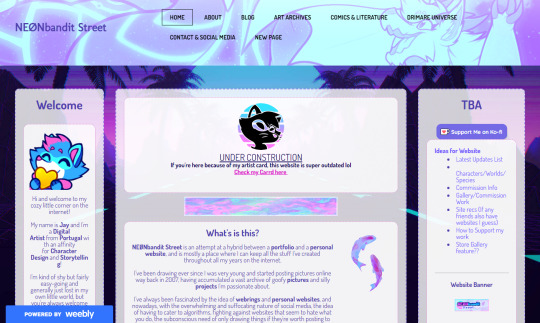
W3Schools is the MVP for this stuff since it has basically everything you can learn about HTML/CSS/etc! For my Website I remember first starting by trying to create the navbar, looking at the Weebly mockup and trying to mentally deconstruct it all into boxes to try and understand how I could recreate it with my own code!
(The reason my navbar looks so different from the screenshot was because I had a really hard time recreating it xD And I ended up with something a lot more basic to match my skillset!)
Something that always worked for me was using templates and just trial and error my way into trying to understand what did what x)
Considering my website has the three-column format, I do recall using SadGrl's Layout Maker code as a reference for my own!
And I guess that's advice I can give?? Finding websites you like, or if you're wondering how someone did something, how their font has weird colours, what animations they're using, etc etc, just go look into their source code, or use the Inspect Tool (F12) and select elements to try and understand the code!
I do sometimes hide goofy hidden text and easter eggs in my source codes, so I'm personally cool with people looking through mine to understand how I did things :)
I definitely relate to this all being overwhelming or confusing at the start, so I'd say just take it slow and make things fun for yourself! I used weird fonts and bright colours when trying to see what does what, use dumb placeholder texts and images too LMAO
Another thing that helped was that I found gifs and images I liked to place on the website and try to make it feel all the more personal and cozy!
Again this is just my personal experience and what I did to make the learning experience more enjoyable :)
#Jay Asks#Anonymous#Neocities Tag#Sorry for the long ramble!#People don't tend to be very receptive to my methods when I share how I do things x) So take it with a grain of salt#I'm very adamant over the Doing what works best for you logic
19 notes
·
View notes
Text
May Status Update

It’s May! well basically like an hour into it lol 😆, anyways I wanted to write an entry about stuff and the progress on my current commission batch!
Commission batch work in progress:
🌸 Commissions without background: 11 in total
1 still not started
3 still on sketch phase
1 is on base colors
5 are finished!
🌸 Commissions with background: 4 in total
still not started: 2
sketch in progress: 3
from last time I got 2 commissions more, that before I was waiting on which listing they were supposed to belong to, it was basically 1 and 1 from each one!
and yeah, I’m hoping to keep making progress on these this new month! and I’m looking forward to try some other stuff as well!
some more ramblings under the line here
-----------------------------------------------
I recently finished some notebooks I was working on since the beginning of this year, and I’m hoping to be able to sell them on Facebook maybe? I don’t intend to make too much with them since, they’re still far from very professional looking notebooks 😅, but I’m also wanting to invest on more supplies, and I’m taking notes as well to keep learning how to make these better!

I certainly learned a lot during the process of making these XD, I made a lot of mistakes as well lol
Also, here you can see the 2 designs I did, I did another one but the printer ran out of ink and I couldn’t use it lol, (another thing I gotta invest in the future is inks or maybe a new printer lol) and you can see here my Cinch machine!
honestly I’m super tired, I finished these today and I had to store all materials and such again... and ugh... I seriously NEED a shelf to put all these machines and supplies, every time I’m going to use them I gotta take them all out of boxes and they are all under more boxes...gotta put them on boxes again and put everything again in order next to my bed..it also doesn’t look all too nice in there, so I’m going to start seriously looking for shelves next month 😆
Other thing I wanted to ramble about, I recently got into Inkblot! it’s a new art site, it has like around 1 year I think?, it’s still in development but so far it’s been pretty alright, Here’s my site so far:

I’ve been wanting to use it to put all my commission art, I’ve finally catch up to last year’s work, so I can start posting this year work! I also want to put my other works here, kinda using it as a general gallery like the one I had with Deviant art.
There’s still so much I haven’t put here, but slowly filling with art! still doesn’t feel as my old DA’s gallery and sometimes the site loads pretty slowly, but I want to give it a chance since it’s still pretty new, I look forward to see how it evolves. the community part at least seems pretty chill so far!
also has this very cool feature, where you can make comparisons!! it has a sort of thing that you move it and you can see the difference between both pictures.

I’ll definitely still be using Tumblr for art gallery as well, I already have posted a lot of art here anyways lol, I’ve managed to organize a lot of my art with the tags as well, although I think I’ll also be separating commission art without background and with backgrounds, that way they are all not too mixed up!
Oh also, I’ve learned about Neocities! recently people were talking about it on Twitter, and seems like a cool option for a personalized website! although may first have to learn more about html coding 😆

Neocities is an open source site, you can own a site here and customize it however you want, but you gotta do it from scratch! it’s honestly pretty cool, I think customization of Tumblr themes is pretty close to this,
but even so, if you check the sites from here just for fun, THEY ARE FANTASTIC! it’s like taking a look at internet in 2008, the customization value is so cool!
I personally find very fun the customization options like this, I may want to give this a try some day 😄
Well I think that’s all, this ramble became a bit too long lol but well, thanks if you read this far!
Hope you have a great first week of May!

28 notes
·
View notes
Text
Android app development companies in India
Elevate your business to new heights with TechGlide, one of the premier Android app development companies in India. Our team of skilled developers is committed to delivering cutting-edge mobile solutions tailored to meet your unique requirements. Whether you are a startup or an established enterprise, we specialize in crafting high-performance Android applications that captivate users and drive business growth.
#custom software development companies in india#android app development companies in india#custom web application development services#html website design with source code
0 notes
Text
Discover 5+ CSS Calculators

Welcome to CSS Monster, your premier destination for exploring our latest collection of CSS calculators, meticulously curated for February 2022. This collection represents a carefully hand-picked assortment of free HTML and CSS calculator code examples, thoughtfully sourced from reputable platforms such as CodePen, GitHub, and various other resources. In this month's update, we've introduced four new items, ensuring you stay at the forefront with the most innovative and functional calculator designs. CSS calculators, interactive elements crafted using HTML and CSS, can seamlessly integrate into your website or application. They provide a user-friendly interface for performing calculations and can be customized to suit a variety of needs, from basic arithmetic to complex scientific calculations. Uncover the advantages of CSS calculators: Customizability: HTML and CSS empower you to create a calculator tailored to your specific requirements, ensuring seamless integration into your project's design. Interactivity: CSS calculators introduce an interactive element to your website or application, enhancing user engagement and providing a dynamic user experience. Versatility: From simple addition and subtraction to more intricate scientific calculations, CSS calculators can be tailored to a wide range of uses, making them a versatile tool for developers. Our collection boasts a diverse array of styles and designs, guaranteeing a suitable match for every project. Whether you seek the simplicity of a basic arithmetic calculator or the complexity of a scientific calculator, our collection has you covered. Each calculator is accompanied by its own HTML and CSS code example, streamlining the implementation process into your projects. We trust that this collection will serve as a valuable resource, providing inspiration and practical solutions for your projects. Enjoy the journey of exploration and innovation with CSS Monster!
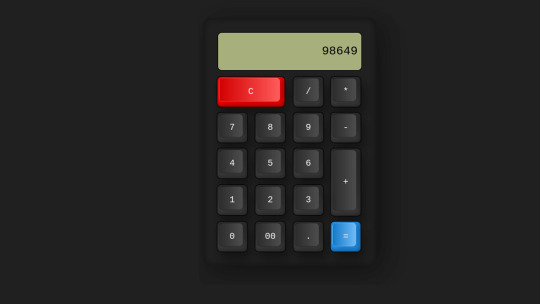
Author gambhirsharma January 20, 2022 Links Just Get The Demo Link How To Download - Article How To Download - Video Made with HTML / CSS About a code PURE CSS CALCULATOR Compatible browsers:Chrome, Edge, Firefox, Opera, Safari Responsive:no Dependencies:-

Author Tirso Lecointere July 29, 2021 Links Just Get The Demo Link How To Download - Article How To Download - Video Made with HTML / CSS (SCSS) / JS About a code GLASSMORPHISM CALCULATOR UI Compatible browsers:Chrome, Edge, Firefox, Opera, Safari Responsive:no Dependencies:-

Author vrugtehagel July 12, 2020 Links Just Get The Demo Link How To Download - Article How To Download - Video Made with HTML / CSS About a code PURE CSS CALCULATOR Compatible browsers:Chrome, Edge, Firefox, Opera, Safari Responsive:yes Dependencies:-

Author William Jawad June 13, 2020 Links Just Get The Demo Link How To Download - Article How To Download - Video Made with HTML / CSS About a code CASIO FX-702P Compatible browsers:Chrome, Edge, Firefox, Opera, Safari Responsive:no Dependencies:-

Author shreyasminocha June 3, 2018 Links Just Get The Demo Link How To Download - Article How To Download - Video Made with HTML / CSS About a code FX-82MS SCIENTIFIC CALCULATOR Compatible browsers:Chrome, Edge, Firefox, Opera, Safari Responsive:no Dependencies:-

Author Varun A P February 2, 2018 Links Just Get The Demo Link How To Download - Article How To Download - Video Made with HTML / CSS (SCSS) About a code CALCULATOR Compatible browsers:Chrome, Edge, Firefox, Opera, Safari Responsive:no Dependencies:-
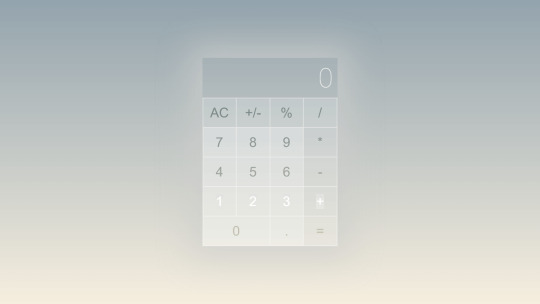
Author magnificode February 25, 2016 Links Just Get The Demo Link How To Download - Article How To Download - Video Made with HTML / CSS (SCSS) About a code CALCULATOR Compatible browsers:Chrome, Edge, Firefox, Opera, Safari Responsive:no Dependencies:-
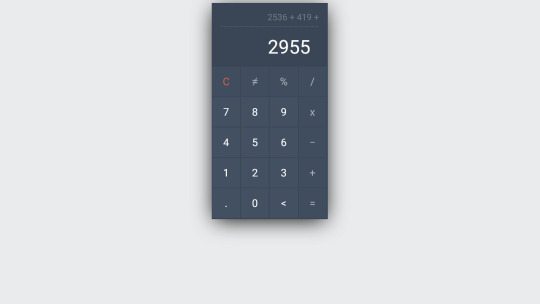
Author Kalpesh Singh February 13, 2016 Links Just Get The Demo Link How To Download - Article How To Download - Video Made with HTML / CSS / JS About a code PURECALC Compatible browsers:Chrome, Edge, Firefox, Opera, Safari Responsive:no Dependencies:-
Frequently Asked Questions
1. What sets CSS Monster's CSS calculator collection apart? CSS Monster's calculator collection is distinctive with a curated selection, featuring four new additions in the February 2022 update. Each calculator is hand-picked from reputable sources like CodePen and GitHub, ensuring diversity and innovation. 2. How often does CSS Monster update its CSS calculator collection? The CSS calculator collection is regularly updated to stay current with design trends. The February 2022 update introduces four new calculators, showcasing a commitment to providing fresh and innovative content. 3. Can I use the showcased CSS calculators for commercial projects? Certainly! All calculators featured on CSS Monster are crafted using HTML and CSS and come with permissive licenses, making them suitable for both personal and commercial projects. Always check the licensing information for specific details. 4. What advantages do CSS calculators offer for web development? CSS calculators offer customizability, allowing you to create calculators tailored to your specific needs. They introduce interactivity, enhancing user engagement, and are versatile, catering to a wide range of applications. 5. How can I integrate the showcased CSS calculators into my projects? Integration is seamless. Each calculator in the collection comes with its own HTML and CSS code example, facilitating easy implementation into your projects. Simply copy and paste the code, making any necessary adjustments. 6. Are CSS calculators suitable for complex scientific calculations? Absolutely! CSS calculators in the collection span from basic arithmetic to complex scientific calculations, showcasing their versatility and suitability for various applications. 7. Can I customize the showcased CSS calculators to match my project's design? Indeed! HTML and CSS provide the flexibility to customize calculators to align with your project's aesthetic. Feel free to modify the code to suit your specific design preferences.
Conclusion:
In conclusion, CSS Monster is not just a collection of CSS calculators; it's a dynamic platform designed to inspire and empower web developers. Whether you're an experienced developer seeking fresh ideas or a beginner eager to explore CSS design, our collection caters to all. Dive into the world of CSS calculators on CSS Monster and enhance your web development projects with creativity and efficiency! Read the full article
4 notes
·
View notes
Text
How To Make Multiple Choice Quiz In Html Code

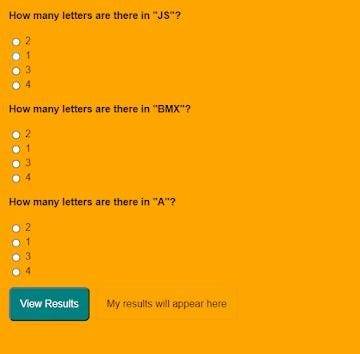
first, you play Multiple Choice Questions (MCQ) Quiz and then click on View results The results page will then be shown. This Multiple Choice Questions (MCQ) Quiz will be finished using JavaScript Code, a powerful language that allows for anything.
100+ JavaScript Projects For Beginners With Source Code
Live Preview Of Multiple Choice Questions Source Code and Preview:-
As you are looking in the project preview how the thing is organized.
Following is the feature of our project:-
We have arranged the Questions and options in the list format using the tag.
Then we set the option using span and defining the radio button and giving the appropriate value.
Multiple Choice Quiz Html Code:-
Now I’ll be telling you to define the structure using HTML. Not from scratch, just the code which is under the body tag.
We have the following part in the HTML section:
Portfolio Website Using HTML CSS And JavaScript ( Source Code)
First, we call the ul class which we have defined the class as a quiz.
Then using the tag we have set our question in the tag.
Then we used a label tag and called the radio button given the value and using span we have given the answer.
Similarly, we have done this for all the options and for all the questions.
Go through the code below and run it in our IDLE before CSS Styling.
<ul class="quiz"> <li> <h4>How many letters are there in "JS"?</h4> <ul class="choices"> <li> <label ><input type="radio" name="question0" value="A" /><span >2</span ></label > </li> <li> <label ><input type="radio" name="question0" value="B" /><span >1</span ></label > </li> <li> <label ><input type="radio" name="question0" value="C" /><span >3</span ></label > </li> <li> <label ><input type="radio" name="question0" value="D" /><span >4</span ></label > </li> </ul> </li> <li> <h4>How many letters are there in "BMX"?</h4> <ul class="choices"> <li> <label ><input type="radio" name="question1" value="A" /><span >2</span ></label > </li> <li> <label ><input type="radio" name="question1" value="B" /><span >1</span ></label > </li> <li> <label ><input type="radio" name="question1" value="C" /><span >3</span ></label > </li> <li> <label ><input type="radio" name="question1" value="D" /><span >4</span ></label > </li> </ul> </li> <li> <h4>How many letters are there in "A"?</h4> <ul class="choices"> <li> <label ><input type="radio" name="question2" value="A" /><span >2</span ></label > </li> <li> <label ><input type="radio" name="question2" value="B" /><span >1</span ></label > </li> <li> <label ><input type="radio" name="question2" value="C" /><span >3</span ></label > </li> <li> <label ><input type="radio" name="question2" value="D" /><span >4</span ></label > </li> </ul> </li> </ul> <button class="view-results" onclick="returnScore()">View Results</button> <span id="myresults" class="my-results">My results will appear here</span>
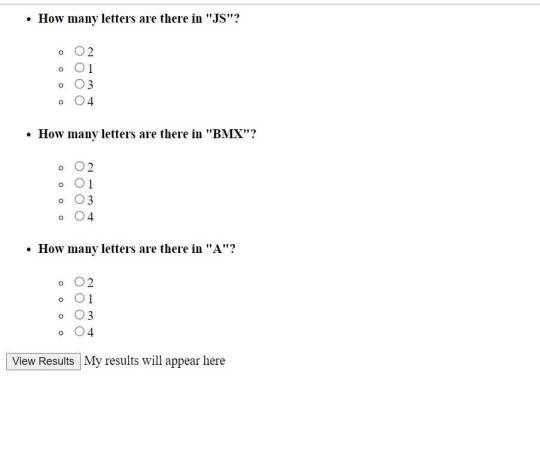
CSS Code For Styling Multiple Choice Quiz:-
By CSS design we will design our whole page here it is just a quiz so we’ll just add a background color, color to the button, and font family for the whole body.
And set the padding of the questions and options so that it doesn’t get messy and looks in a systematic order.
10+ Javascript Project Ideas For Beginners( Project Source Code)
The analysis will be aided by the CSS code below. After adding this file to your link rel-tag, wait for the results. We will add some of the basic styling to our quiz app using the default selector, and we will add styling to various quiz app elements using the class selector.
this is simple css code. we do not add any heavy css code because our main aim is to create Multiple Choice Questions (MCQ) functionality. if you need more Better Ui you can add more css code in this css section.
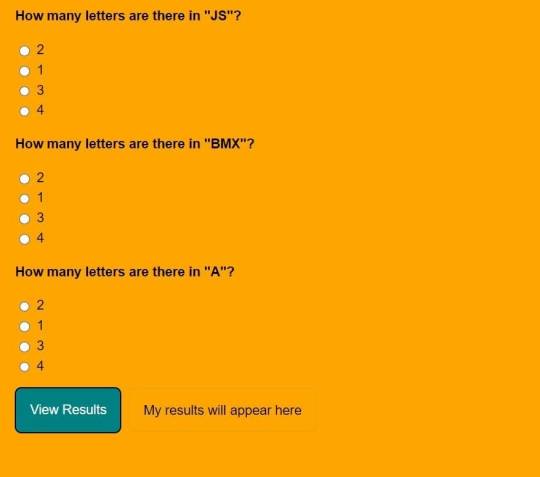
JavaScript Multiple Choice Quiz Code:-
In the JavaScript Code of Multiple Choice Quiz section, we will add logic for initializing our page. The logic must know what is correct and incorrect, So we’ll define there the correct option and then we’ll set that when the user clicks on the button the logic will generate and tell the user about his/her score.
Restaurant Website Using HTML and CSS
Through this blog, we have learned how to design Multiple Choice Quizzes using HTML, CSS & JavaScript.
Final Output Of Multiple Choice Quiz in HTML and JS Code:
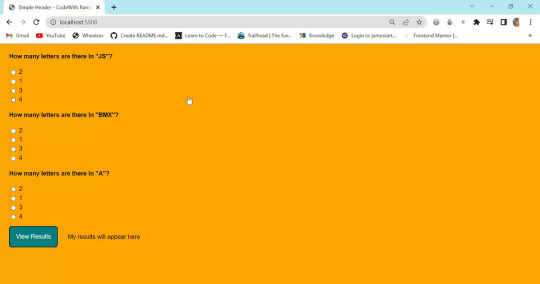
Now I’m looking for some positive reviews from your side.
So, How was the blog Learners,
If you want a more interesting blog like this then please check our Blog sites. Stay tuned because every day you will learn something new here.
I hope that I’m able to make you understand this topic and that you have learned something new from this blog. If you faced any difficulty feel free to reach out to us with the help of the comment box and if you liked it, please show your love in the comment section. This fills bloggers’ hearts with enthusiasm for writing more new blogs.
Ecommerce Website Using Html Css And Javascript Source Code
Happy Coding
click and get full article and get complete source code
That’s it, folks. In this article, we shared 10+ Portfolio Website templates with cool and different designs.
Hope you liked this article. Share this with your fellow developers. Comment down below your thoughts and suggestions, we would love to hear from you.
See our other articles on codewithrandom and gain knowledge in Front-End Development.
Thank you and keep learning!!
follow us on Instagram: Ashutosh Mishra
2 notes
·
View notes
Text
What is FAQ schema markup? - IT Mindslab
In the ever-evolving landscape of search engine optimization (SEO), staying ahead of the curve is crucial. One tool that has gained prominence in recent years is FAQ schema markup. This structured data technique provides a means to enhance your website’s appearance in search results and improve the user experience by providing quick answers to common questions. In this article, we’ll dive into what FAQ schema markup is, how it works, its benefits, and how to implement it effectively.
For more information: What is faq schema markup? - IT Mindslab
What Is FAQ Schema Markup?
FAQ schema markup is a type of structured data that webmasters and SEO professionals can add to their web pages to help search engines understand the content better. It’s specifically designed to highlight frequently asked questions and their respective answers on a webpage. When implemented, search engines can display these questions and answers directly in search results, often in the form of a rich snippet.
How Does FAQ Schema Markup Work?
FAQ schema markup uses a standardized format that includes specific properties and values within your website’s HTML code. These properties inform search engines about the structure of your FAQ content. Here’s a basic breakdown of how it works:
Question: You mark up each frequently asked question on your webpage using the <question> property.
Answer: You associate each question with its corresponding answer using the <answer> property.
FAQPage: You encapsulate all your questions and answers within a <script> tag with the type attribute set to "application/ld+json". Inside this script, you define a structured JSON-LD object that specifies the content as an FAQPage.
Structured Data Testing: Before publishing your page, it’s essential to use Google’s Structured Data Testing Tool or other similar tools to validate your markup and ensure it’s error-free.
Benefits of FAQ Schema Markup
Enhanced Search Visibility: FAQ rich snippets stand out in search results, increasing click-through rates and visibility.
Improved User Experience: Users can quickly find answers to their questions without clicking through to your website, enhancing the user experience.
Authority and Trust: Google often selects pages with FAQ schema markup as featured snippets, positioning your content as an authoritative source.
Catering to Voice Search: FAQ markup aligns with voice search queries, making it more likely that your content will be selected as a voice search answer.
Mobile Optimization: Rich snippets are especially beneficial on mobile devices, where screen space is limited.
Implementing FAQ Schema Markup
To implement FAQ schema markup effectively, follow these steps:
Identify Relevant FAQs: Determine which frequently asked questions are relevant to the content on your page.
Write Clear Answers: Craft concise and informative answers that directly address the questions.
Add Markup Code: Insert the structured data markup within the HTML of your webpage.
Test Your Markup: Use Google’s Structured Data Testing Tool to ensure there are no errors in your markup.
Monitor Performance: Keep an eye on your search performance to gauge the impact of your FAQ schema markup.
Advanced Features and Properties
Multiple FAQs: You can mark up multiple sets of FAQs on a single page, allowing you to address various topics or sections comprehensively. Each FAQ section should be enclosed within its own <script> tag with the JSON-LD structured data.
Accordion Format: FAQ schema markup often complements accordion-style FAQ sections on webpages. When users click on a question, the corresponding answer expands, providing a seamless and interactive user experience.
Nested FAQs: You can create hierarchical FAQ structures with nested questions and answers, offering in-depth information on a specific topic. Nested FAQs use the same properties (<question> and <answer>) within the JSON-LD structured data.
For more information: What is faq schema markup? - IT Mindslab
3 notes
·
View notes
Text

Unlocking the Potential of Your Website with SEO Services Are you striving to elevate your website's visibility and drive more traffic to your business? Look no further, because SEO services are your golden ticket! 🎫 In the digital era, where the internet is saturated with content, SEO — or Search Engine Optimization — is not just a buzzword; it's an essential strategy for digital survival and success. What Are SEO Services? SEO services are a suite of strategies, techniques, and practices aimed at improving the visibility and ranking of your website on search engines like Google, Bing, or Yahoo. When implemented correctly, SEO can be a game-changer for your online presence, helping potential customers find you easily amongst a sea of competitors. Why is SEO Important? Imagine having a billboard in the desert; no matter how brilliant your message is, if no one passes by, it’s pointless. That's your website without SEO. With the right SEO services, your virtual billboard is not just visible but impossible to miss! Key Components of SEO Services SEO services encompass a variety of tactics that can broadly be categorized into:
On-Page SEO This involves optimizing individual web pages to rank higher and earn more relevant traffic. On-page refers to both the content and HTML source code of a page that can be optimized, such as: Keyword Research and Optimization: Discovering the best keywords that your potential customers are using to find products or services like yours. Content Creation: Crafting high-quality, relevant content that includes targeted keywords naturally. Meta Tags: Writing effective title tags and meta descriptions that get clicks. URL Structure: Ensuring your URLs are simple and structured to be user-friendly. Internal Linking: Creating a network within your site to help with navigation and distribute page authority and ranking power throughout the site.
Off-Page SEO This focuses on external ranking factors like: Backlinks: Building a portfolio of high-quality links from other websites to yours, which act as endorsements in the eyes of search engines. Social Media: Leveraging social platforms to enhance brand presence and encourage traffic back to your site. Influencer Outreach: Collaborating with influencers to widen your reach.
Technical SEO This is all about the non-content elements of your website. It includes strategies to improve a site's backend structure and foundation, such as: Site Speed: Ensuring your site loads quickly for users and search engines. Mobile-Friendliness: Adapting your site for a seamless mobile user experience. Indexing: Making sure search engines can crawl and index your site without any issues. Site Architecture: Designing a site that's easy for visitors to navigate and for search engines to understand. Benefits of SEO Services By harnessing the power of SEO services, you can: Increase Visibility: Appear higher in search engine rankings when your target audience searches for keywords related to your business. Boost Organic Traffic: Attract more visitors naturally without relying solely on paid advertising. Enhance User Experience: Provide a better experience for your visitors, encouraging them to stay on your site longer. Gain Credibility: High search rankings make your brand appear more credible and trustworthy. Improve Conversion Rates: As more targeted traffic comes to your site, you're more likely to convert visitors into customers. Selecting the Right SEO Service Provider Choosing an SEO service provider is a critical decision that can either propel your business to new heights or lead to wasted resources. Here’s what to look for: Experience and Expertise: A proven track record and deep knowledge of the latest SEO trends and Google algorithm updates. Customized Strategy: A provider that offers tailor-made strategies to suit your specific business needs and goals. Transparency: Regular and clear reporting on the performance and the tactics used. Ethical Methods: Commitment to using white-hat SEO techniques that ensure a sustainable ranking without the risk of penalties. In Conclusion In the digital race for visibility, SEO services are your steadfast ally. Whether you're a small business or a multinational corporation, SEO services can catapult your website from the shadows of the internet into the limelight. Don't let your website be the best-kept secret on the web. Invest in professional SEO services and watch as your website transforms into a beacon for your target audience. Ready to start your journey to the top of the search results? Contact an SEO expert today and take the first step towards digital dominance!
2 notes
·
View notes
Text
Offer Tips And Guidance For Aspiring Web Developers

Web Development Career Advice: Offer tips and guidance for aspiring web developers, including learning resources, career paths, and job market insights.
Web development is an exciting and dynamic field that offers countless opportunities for aspiring developers. Whether you’re just starting your journey or looking to advance your career, this article provides valuable advice and guidance to help you thrive in the world of web development.
1. Learn Continuously
Web development is constantly evolving, with new technologies, frameworks, and best practices emerging regularly. To stay relevant and competitive, it’s essential to commit to lifelong learning. Here are some tips:
Online Courses: Platforms like Udemy, Coursera, edX, and Codecademy offer a wide range of web development courses, from beginner to advanced levels.
Documentation and Tutorials: Read documentation and follow tutorials for the technologies you’re interested in. Official documentation is a valuable resource.
Books: Invest in web development books that cover fundamental concepts and provide in-depth knowledge on specific topics.
Online Communities: Join developer forums, participate in discussions, and ask for help when needed. Sites like Stack Overflow and GitHub are great places to start.
2. Choose Your Path
Web development offers various career paths. To determine which one aligns with your interests and goals, consider the following options:
Frontend Developer: Focuses on the visual aspects of websites, including HTML, CSS, and JavaScript.
Backend Developer: Works on server-side development, handling databases, servers, and business logic.
Full-Stack Developer: Manages both frontend and backend, offering a comprehensive understanding of web development.
Specialized Roles: Consider roles like mobile app development, DevOps, or UI/UX design, which require specific skills.
3. Build a Strong Portfolio
A portfolio is your professional identity. It showcases your skills, projects, and capabilities to potential employers or clients. Here’s how to create an impressive portfolio:
Include Diverse Projects: Showcase a variety of projects that highlight your versatility and expertise.
Keep It Updated: Regularly add new projects and skills to your portfolio.
Detail Your Process: Explain the problem, solution, and technologies used in each project.
Share Your Code: Provide links to GitHub or other version control repositories to demonstrate your coding skills.
4. Gain Practical Experience
While learning theory is essential, practical experience is equally crucial. Here’s how to gain hands-on experience:
Freelance Work: Take on freelance projects to apply your skills in real-world scenarios.
Open Source Contributions: Contribute to open-source projects to collaborate with experienced developers and improve your skills.
Internships: Internships provide valuable industry experience and the chance to learn from professionals.
5. Networking
Building a strong professional network can open doors to job opportunities and collaborations. Here’s how to network effectively:
Attend Meetups and Conferences: Participate in web development events to meet like-minded individuals.
Online Communities: Join forums, Slack groups, and social media channels dedicated to web development.
LinkedIn: Create a professional LinkedIn profile to connect with industry peers and potential employers.
6. Stay Informed About the Job Market
Web development job trends can vary by region and industry. Stay informed about the job market by:
Research: Explore job postings on various job boards to understand employer expectations and trends in your area.
Consult Industry Reports: Industry reports and surveys provide insights into in-demand skills and salary trends.
7. Soft Skills Are Important
In addition to technical skills, soft skills like problem-solving, communication, and teamwork are highly valued by employers. Cultivate these skills to become a well-rounded developer.
Conclusion: Your Journey to Web Development Success
Web development is a dynamic and rewarding field, offering opportunities for those with passion and determination. By continuously learning, building a strong portfolio, gaining practical experience, networking, and staying informed about the job market, you can embark on a successful web development career.
Remember that success in web development requires commitment and persistence. Keep learning, adapt to changes, and stay passionate about creating innovative web solutions. With dedication, you can thrive in this exciting and ever-evolving industry.
Source:
#kushitworld#saharanpur#india#itcompany#seo#seo services#webdevelopment#digitalmarketing#websitedesigning
3 notes
·
View notes
Text
Wix Vs WordPress
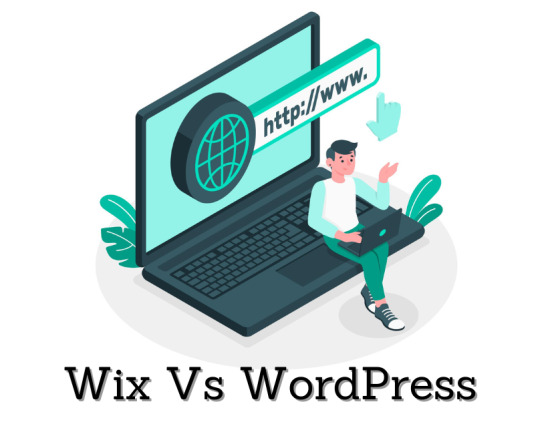
Both Wix and WordPress offer fantastic features, regardless of whether you think a free website builder should host your blog or build an e-commerce website for selling your handcrafted items. If a feature isn't native to one platform or the other, there are programs or plugins to help you expand the functionality of your site. Your needs and goals, which you will discuss with your website application development business, will determine the best option for you.
The Difference Between WordPress and Wix in 2023
Comprehensive solutions, including WordPress and Wix*-based content management systems, are offered by seasoned website creation companies like Novalabs. Ask our specialists how to utilize the free website builder.
What is Wix?
With Wix, you can create your own website without needing to know how to code. It's a "software-as-a-service" (SaaS) tool, meaning you pay a monthly price to utilize it rather than own the product.
What is WordPress?
In 2003, Matt Mullenweg and Mike Little founded WordPress as a platform for blogging. Since then, it has evolved into a totally free website builder.
By the year 2022, it will be widely known. According to BuiltWith.com, the platform is currently used by about 36.5 million live websites.
There are two distinct WordPress configurations to take into account:
Web-based WordPress
Similar to Wix, hosted WordPress is a software-as-a-service (SaaS) platform for creating and managing websites that can be accessed at wordpress.com.
Although it started out as a blogging service, it is now a fully functional website builder. You pay a regular charge to use it, and in exchange, you get access to a wide range of components that help you build a website.
WordPress Self-Hosted
You can download and install the self-hosted WordPress program from wordpress.org on your own web server. This suggests that you should get hosting so that your website has a location. Currently, WordPress is open-source, which means that the code that powers it is easily available and modifiable.
Wix vs. WordPress: Points to consider
1. Usability
One of the simplest website builders to use to create a website is Wix. Why? You can change everything in your program without installing any additional software. Their user interface is quite simple and intuitive, especially for total beginners. They also have an Application Market where you can add features with a single click if you ever want to add more functionality.
However, compared to WordPress, Wix requires far more work to construct a website. WordPress is also well-known for its modules and plugins. However, installing or performing them is typically not that simple. To establish a site, the software as a whole basically needs a little bit of specialized training or at the very least some development experience.
2. Design and adaptability
There are roughly 1,000 (yes, 1,000!) free templates in Wix's layout library. They are organized into classes (websites, cafés, photographers, etc.) and are slick and modern.
Whatever the case, you can undoubtedly relax because Wix offers a perspective that is entirely transportable. Although this is totally acceptable for Google (more on this later), you might need to re-arrange a few features (using intuitive) to properly serve your site on mobile devices.
With Wix versus WordPress, you can get the exact you need if you know CSS and HTML or, on the other hand, if you wouldn't mind investing a few hours figuring out how to update your layout's code.
3. Plugins and Apps
There are many methods to expand your industry-specific site on Wix, and you can choose from 300 free and paid applications in the application market. There are incredible apps for things like lodging reservation systems, artist picture displays, or invoice generation, for instance. The fact that some of these applications are created by Wix itself is actually extremely significant.
WordPress is renowned for its plugins, which include those for virtual entertainment, contact management, website design improvement, and more. WordPress serves as a good example of this since there is actually a plugin for everything. Although Wix's applications are much easier to set up and maintain, your choice is subject to some restrictions.
Conclusion
It implies that the best free website builder depends on the type of site you want to create. Hiring a WordPress website development business is perhaps the best option if you require a solid solution that will scale over time.
However, Wix is helpful for smaller, more modest sites that take less work and have an adequate design. The choice you make in the end will rely on what you really want from your website.
5 notes
·
View notes